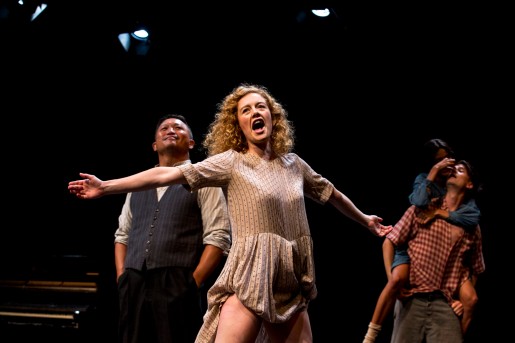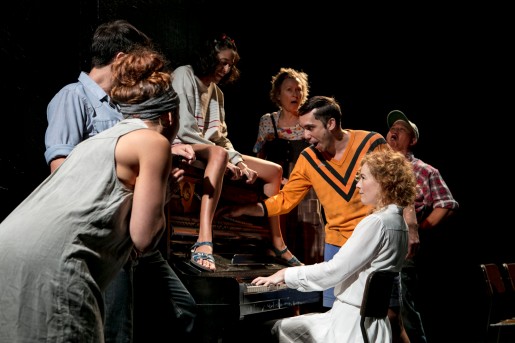Belvoir St Theatre, December 10
6/10
Like Miles Franklin’s novel, Kendall Feaver’s play begins with Sybylla Melvyn delighting in telling us that the story we are about to hear is all about herself. Fascinated by trying to figure out her place in the grand scheme, and cursed with a restless desire for more than life is likely to bestow, she consumes herself as her own mental and emotional sustenance. She is vain, but not narcissistic, being afflicted, like many teenaged girls, with a terror of being thought ugly.

One suspects she also finds herself easily the most interesting person she knows, and the problem with both Feaver’s adaptation and Kate Champion’s production is that she’s absolutely right. Nikki Shiels’ Sybylla dominates the stage to the extent that she seems to be surrounded by phantoms rather than characters: line-delivering apparitions who don’t inhabit the same plane of flesh-and-blood existence.
Despite the function of many of these characters being to try to dull her effervescence, they must be real people, nonetheless, not shades and cut-outs. Most pertinently Harry Beecham needs to be an assured and worthy foil for Sybylla, not the limp figure realised by Feaver’s writing and Guy Simon’s performance. This Harry provides no sense of why Sybylla would turn her attention from herself long enough to even notice he’s a man, let alone one she could contemplate marrying.
This pattern of anonymity is replicated through most of the lesser roles, with one glorious exception. When Sybylla is packed off to be governess of the boorish McSwats, the whole play suddenly comes to life: Feaver’s writing is assured, Champion’s direction is bold, and the ensemble of Simon, Blazey Best, Jason Chong, Tom Conroy, Emma Harvie and Tracy Mann seethe with a keen sense of character and a non-realist theatricality.

If the play perks up to this extent when Feaver invents material beyond the remit of the book, one wonders if the work is overly reverential; if more opportunities existed to unlock theatrical potential, allowing the writing to be more playful and the acting less forced.
Even the Sybylla whom Feaver and Shiels have created – more sensuous than Franklin’s character, and seeming to revel in her own volatility (where Franklin’s can be frightened by it) – is not devoid of problems. Crucial to the book’s intensity is that it was penned by a teenager, and while Shiels is a completely convincing teen early on, she seems to age too abruptly. Sybylla is not suddenly moulded into adulthood by the harshness of her childhood, her thwarted aspirations and her confusion over Harry: she remains a feisty young dreamer despite these squalls and setbacks.

Nor is this version of Sybylla’s story quite sad enough. Obviously she should not be portrayed as a victim, and would be contemptuous of that perception of herself. But there should be a deeper sense of tragedy in her awareness of being trapped in a patriarchal paradigm; trapped in an era that couldn’t countenance an anti-marriage modernist; trapped in the boondocks of New South Wales when aspiring to be an artist. We feel this sadness when Sybylla’s mother Lucy (Blazey Best) says she wouldn’t wish her own life – of endless graft, no reward and a loveless marriage – on anyone. Sybylla’s future at the end is comparably bleak, even if she’s eliminated the marriage option, and perhaps the play could have deviated from book’s almost unnerving stoicism to dare to scratch its nails down our faces for a moment.
Until January 31.